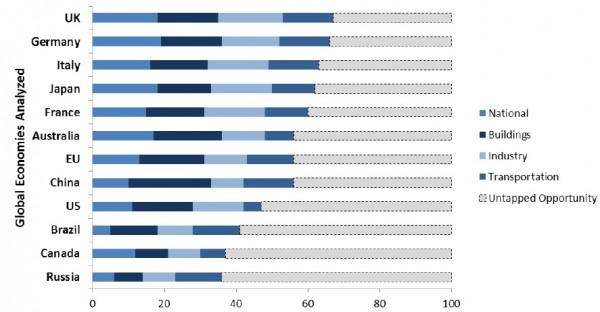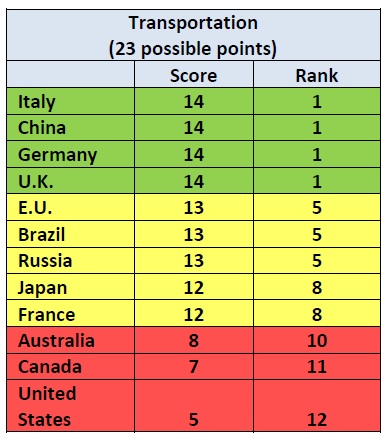USA, you’re not No. 1. You’re not even No. 2. No, when it comes to energy efficiency, the United States of America is a woeful ninth in a new ranking of 12 of the world’s largest economies, who together make up 78 percent of global GDP, 63 percent of energy consumption and 62 percent of greenhouse gas emissions.
The United Kingdom leads the way in the estimation of the American Council for an Energy-Efficient Economy, which based its rankings on a combination of performance and policy metrics. Germany, Italy, Japan and France round out the top five, in that order.

“The U.K. and the leading economies of Europe are now well ahead of the United States when it comes to energy efficiency,” ACEEE Executive Director Steven Nadel said in a statement.
Nadel said the U.S. actually fares pretty well in making its buildings efficient – fourth behind just China, Australia and the European Union – in part because its appliance and equipment standards are the best in the world.
But the U.S. stumbles badly when it comes to transportation, finishing dead last. Only in areas of moving freight is U.S. transportation deemed at all efficient. Meanwhile, it’s simply miserably wasteful when it comes to how much driving its citizens do. Apparently there’s something to the lore about the American love affair with the automobile.
“The United States stands out negatively in this category with an average vehicle miles traveled (VMT) per person that is more than twice that of most countries and more than 30 percent greater than the next lowest country, Canada,” the report [PDF] says.
ACEEE has some recommendations for how the U.S. can improve. The group says the country “should reconsider the pricing of transportation, and facilitate the adoption of policies such as ‘pay-as-you-drive’ insurance, in which the cost is determined primarily by the number of miles traveled.” That insurance thing might fly, but as for making it more expensive to drive, God bless the politician who suggests a policy to advance that.
ACEEE also recommends that the U.S. “adopt the proposed increases in Corporate Average Fuel Economy (CAFE) standards, which would result in average fuel economy of 49.6 miles per gallon in 2025.” The Obama administration and 13 major automakers agreed last year on a 54.5 mpg fuel efficiency standard by 2025, but President Obama’s Republican challenger, Mitt Romney, has signaled he might pull back on such a lofty figure, saying that “CAFE standards hurt domestic automakers” and “CAFE standards must not be overly burdensome.”

More broadly, the ACEEE report suggests that the nation needs some kind of tangible, easy-to-understand national energy savings target to aim for.
“Congress should pass a national energy savings target to complement existing state policies and raise the bar for all states,” the group says. “Most countries analyzed in the Scorecard have such targets. In the interim, the states without mandatory targets for utility energy savings should adopt them.”